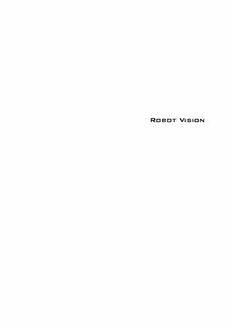Table Of ContentI
Robot Vision
Robot Vision
Edited by
Aleš Ude
In-Tech
intechweb.org
Published by In-Teh
In-Teh
Olajnica 19/2, 32000 Vukovar, Croatia
Abstracting and non-profit use of the material is permitted with credit to the source. Statements and
opinions expressed in the chapters are these of the individual contributors and not necessarily those of
the editors or publisher. No responsibility is accepted for the accuracy of information contained in the
published articles. Publisher assumes no responsibility liability for any damage or injury to persons or
property arising out of the use of any materials, instructions, methods or ideas contained inside. After
this work has been published by the In-Teh, authors have the right to republish it, in whole or part, in any
publication of which they are an author or editor, and the make other personal use of the work.
© 2010 In-teh
www.intechweb.org
Additional copies can be obtained from:
[email protected]
First published March 2010
Printed in India
Technical Editor: Martina Peric
Cover designed by Dino Smrekar
Robot Vision,
Edited by Aleš Ude
p. cm.
ISBN 978-953-307-077-3
V
Preface
The purpose of robot vision is to enable robots to perceive the external world in order to
perform a large range of tasks such as navigation, visual servoing for object tracking and
manipulation, object recognition and categorization, surveillance, and higher-level decision-
making. Among different perceptual modalities, vision is arguably the most important one. It
is therefore an essential building block of a cognitive robot. Most of the initial research in robot
vision has been industrially oriented and while this research is still ongoing, current works
are more focused on enabling the robots to autonomously operate in natural environments
that cannot be fully modeled and controlled. A long-term goal is to open new applications
to robotics such as robotic home assistants, which can only come into existence if the robots
are equipped with significant cognitive capabilities. In pursuit of this goal, current research
in robot vision benefits from studies in human vision, which is still by far the most powerful
existing vision system. It also emphasizes the role of active vision, which in case of humanoid
robots does not limit itself to active eyes only any more, but rather employs the whole
body of the humanoid robot to support visual perception. By combining these paradigms
with modern advances in computer vision, especially with many of the recently developed
statistical approaches, powerful new robot vision systems can be built.
This book presents a snapshot of the wide variety of work in robot vision that is currently
going on in different parts of the world.
March 2010
Aleš Ude
VII
Contents
Preface V
1. Design and fabrication of soft zoom lens applied in robot vision 001
Wei-Cheng Lin, Chao-Chang A. Chen, Kuo-Cheng Huang and Yi-Shin Wang
2. Methods for Reliable Robot Vision with a Dioptric System 013
E. Martínez and A.P. del Pobil
3. An Approach for Optimal Design of Robot Vision Systems 021
Kanglin Xu
4. Visual Motion Analysis for 3D Robot Navigation in Dynamic Environments 037
Chunrong Yuan and Hanspeter A. Mallot
5. A Visual Navigation Strategy Based on Inverse Perspective Transformation 061
Francisco Bonin-Font, Alberto Ortiz and Gabriel Oliver
6. Vision-based Navigation Using an Associative Memory 085
Mateus Mendes
7. Vision Based Robotic Navigation: Application to Orthopedic Surgery 111
P. Gamage, S. Q. Xie, P. Delmas and W. L. Xu
8. Navigation and Control of Mobile Robot Using Sensor Fusion 129
Yong Liu
9. Visual Navigation for Mobile Robots 143
Nils Axel Andersen, Jens Christian Andersen, Enis Bayramoğlu and Ole Ravn
10. Interactive object learning and recognition with multiclass
support vector machines 169
Aleš Ude
11. Recognizing Human Gait Types 183
Preben Fihl and Thomas B. Moeslund
12. Environment Recognition System for Biped Robot Walking Using Vision
Based Sensor Fusion 209
Tae-Koo Kang, Hee-Jun Song and Gwi-Tae Park
VIII
13. Non Contact 2D and 3D Shape Recognition by Vision System
for Robotic Prehension 231
Bikash Bepari, Ranjit Ray and Subhasis Bhaumik
14. Image Stabilization in Active Robot Vision 261
Angelos Amanatiadis, Antonios Gasteratos, Stelios Papadakis and Vassilis Kaburlasos
15. Real-time Stereo Vision Applications 275
Christos Georgoulas, Georgios Ch. Sirakoulis and Ioannis Andreadis
16. Robot vision using 3D TOF systems 293
Stephan Hussmann and Torsten Edeler
17. Calibration of Non-SVP Hyperbolic Catadioptric Robotic Vision Systems 307
Bernardo Cunha, José Azevedo and Nuno Lau
18. Computational Modeling, Visualization, and Control of 2-D and 3-D Grasping
under Rolling Contacts 325
Suguru Arimoto, Morio Yoshida and Masahiro Sekimoto1
19. Towards Real Time Data Reduction and Feature Abstraction for Robotics Vision 345
Rafael B. Gomes, Renato Q. Gardiman, Luiz E. C. Leite,
Bruno M. Carvalho and Luiz M. G. Gonçalves
20. LSCIC Pre coder for Image and Video Compression 363
Muhammad Kamran, Shi Feng and Wang YiZhuo
21. The robotic visual information processing system based on wavelet
transformation and photoelectric hybrid 373
DAI Shi-jie and HUANG-He
22. Direct visual servoing of planar manipulators using moments of planar targets 403
Eusebio Bugarin and Rafael Kelly
23. Industrial robot manipulator guarding using artificial vision 429
Fevery Brecht, Wyns Bart, Boullart Luc Llata García José Ramón
and Torre Ferrero Carlos
24. Remote Robot Vision Control of a Flexible Manufacturing Cell 455
Silvia Anton, Florin Daniel Anton and Theodor Borangiu
25. Network-based Vision Guidance of Robot for Remote Quality Control 479
Yongjin (James) Kwon, Richard Chiou, Bill Tseng and Teresa Wu
26. Robot Vision in Industrial Assembly and Quality Control Processes 501
Niko Herakovic
27. Testing Stereoscopic Vision in Robot Teleguide 535
Salvatore Livatino, Giovanni Muscato and Christina Koeffel
28. Embedded System for Biometric Identification 557
Ahmad Nasir Che Rosli
IX
29. Multi-Task Active-Vision in Robotics 583
J. Cabrera, D. Hernandez, A. Dominguez and E. Fernandez
30. An Approach to Perception Enhancement in Robotized Surgery
using Computer Vision 597
Agustín A. Navarro, Albert Hernansanz, Joan Aranda and Alícia Casals

